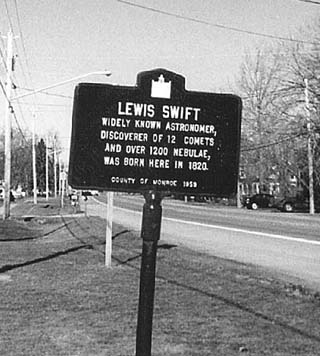
While researching Clarkson Academy alumni, I came across an August 1993 article from a local newspaper announcing a meteor shower. Apparently the Comet Swift-Tuttle, one of the brightest known comets, swung around the sun eight months previous leaving a dense dust cloud that earth would travel through that night. The comet was named after Clarkson Academy alum, Lewis Swift. In his lifetime he discovered 12 comets, hundreds of nebulae and received several gold, silver and bronze medals from leading American and European astronomical societies. How did a farmer's son who grew up in a modest white frame farmhouse on Ridge Road in Clarkson become Professor Swift, who at age 74 began seven years of work at the Lowe Observatory, Echo Mountain, California? The answer to this question may lie in his heritage and a series of events that impacted his life. His grandfather, Rowland Swift, was a Revolutionary War veteran who served in General Putnam's personal guard. His great uncle, Zephaniah Swift, was a prominent jurist in Connecticut, a member of the state legislature and secretary to Chief Justice Ellsworth during his mission to France. After moving to Clarkson, his father, Lewis, Sr. served as justice of the peace, was a pillar of the Clarkson Congregational Church and was called General Swift because of his rank in the militia. He helped organize the Clarkson Library Company in 1822, and later the Clarkson Academy. Amid the typical hardships a pioneer family endured including sieges of Genesee fever, Lewis, Sr. and his wife Anna cleared and operated a farm and raised a family of nine children. Lewis was the sixth. He helped on the farm until he was 13 when he had an accident and fractured his left hip. This injury left him permanently lame and for many years he was unable to walk without crutches. Unfit for the strenuous work on the farm, he was able to go to school and became a member of the first class at the Clarkson Academy. Some of the subjects he studied were arithmetic, algebra, chemistry and philosophy. It is said that he was impressed with an event that happened when he was 15-years-old which would apparently affect the rest of his life: Halley's Comet was visible in the heavens. Other than attending the Academy, Lewis was self educated. He never went to another institution of higher learning even though he did receive honorary degrees later in his life. If it weren't for a broken hip and Halley's comet, history may have been different and there may not be a historical marker in front of the two-story frame home east of Clarkson corners. For information on this famous local astronomer, go on the Monroe County Library website, LIBRAweb Rochester history and read an account by Ralph Bates and Blake McKelvey. (This is the third article in the series on education in Clarkson. Submitted material, Leanna Hale, Clarkson Historian.) May 28, 2006 |
